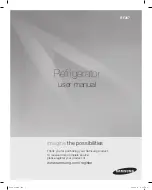
23
CONGRATULATIONS!
You are now the proud owner of a
superb, beautiful and durable addition to your kitchen. The
following information will help you get the most pleasure
from your purchase.
Using your refrigerator:
Cool flowing air keeps your refrigerated foods fresh. Large
containers placed close together may restrict the flow of air.
Space food so cool air can flow around it.
To retain maximum moisture and flavor, cover containers
or seal food in moisture proof wrap. Odorous foods which
might affect others should always be covered.
Meat, fish and poultry can be stored safely in the refrigera
-
tor section for a few days, but as a general rule, the freezer
should be utilized for longer storage.
Vegetables and fruits should be washed, dried and stored
in the slide-out crisper. They will last longer in closed plastic
containers or wrapped in plastic film.
Cover left-overs and use within a couple of days.
Shelves adjust to many positions, allowing versatile storage
and maximum use of space. The adjustable door shelves
hold abundant storage, even tall bottles. Firmly lock
shelves in place before use.
Do NOT block air coming into the refrigerator section.
Food or liquids can freeze if placed too close to inlet air.
All refrigerator crispers, and also the freezer basket sup
-
plied on the side-by-side models, are designed to be at the
very BOTTOM of their compartments.
USE AND CARE GUIDE
!
CAUTION
Using your freezer:
Meats, fish and poultry pre-packed in plastic (self-service)
wrap can be stored in the freezer for a couple of weeks.
For longer freezer storage, wrap food in foil or other vapor-
proof, moisture-proof freezer wrap. Frozen food contain
-
ers should be sealed tightly. If food is wrapped in “Butcher
Paper”, remove and rewrap.
For more even temperature, space food so as not to restrict
air flow, especially at rear.
Light frost may form on shelves when freezer door is open.
After the door is closed, the air stream gradually removes
the frost.
Varying amounts of frost will form occasionally in the freez
-
er compartment, especially in areas near the top air return.
This is normal adjunct of the moist cold air circulating in the
refrigerator section to help food stay fresh longer.
If your freezer has an ice maker:
Install the freezer shelf in the third position down from the
top of the shelf ladder (see Figure 32), this will position the
ice bucket properly for operation of the ice maker.
First buckets may contain contamination from new instal-
lation. Throw away the first two harvests or until the ice is
free of discoloration and taste.
The ice maker makes ice once the freezer is cold. It will
turn off automatically when the ice bucket is full, provided
the bucket is properly positioned.
Lift the Stop Arm up out of the way when removing and
replacing the container.
Never place fingers, foreign objects or food packages near
the Ejector Blade.
Typical cycle of ice maker:
1. The ice maker fills with water.
2.
When the water freezes, the motor rotates Ejector
Blade against the ice. The blade stops when it touches
the ice.
3.
The heater releases the ice from the form.
4.
The motor starts again. The blade moves ice from the
form into the bucket. The Ejector Blade makes two
(2) revolutions and then the ice maker fills with water
again.
NOTE
Содержание M24TF
Страница 1: ...Installation Operation and Maintenance Instructions Built In Refrigerator Freezer M24TF M30TF M36TF ...
Страница 29: ...29 ...
Страница 59: ...29 ...
















































